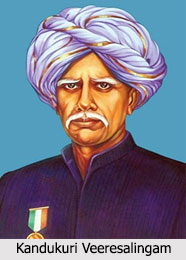 Rao Bahadur Kandukuri Veeresalingam Pantulu was a great social reformer and writer of Andhra Pradesh who was often considered to be the Raja Rammohan Roy of the state. Being a social reformer he encouraged women education and remarriage of widows; he also fought against the dowry system of the erstwhile society. He started a school in Dowlaiswaram in 1874 and `Hithakarini School` in 1908 in Andhra Pradesh. Kandukuri Veeresalingam was inspired by the principles of Brahmo Samaj leaders like Raja Rammohan Roy, Pandit Ishwar Chandra Vidyasagar and Maharshi Keshab Chandra Sen. So in 1887 he constructed a temple as a "Brahmo Mandir". The novel "Rajasekhara Charitramu" written by him is honoured to be the first novel in Telugu literature. Kandukuri Veeresalingam was also known as Gadya Tikkana, which means `Tikkana of Prose`. Kandukuri Veeresalingam died on 27th May 1919. A statue has been constructed in Visakhapatnam to commemorate his contributions.
Rao Bahadur Kandukuri Veeresalingam Pantulu was a great social reformer and writer of Andhra Pradesh who was often considered to be the Raja Rammohan Roy of the state. Being a social reformer he encouraged women education and remarriage of widows; he also fought against the dowry system of the erstwhile society. He started a school in Dowlaiswaram in 1874 and `Hithakarini School` in 1908 in Andhra Pradesh. Kandukuri Veeresalingam was inspired by the principles of Brahmo Samaj leaders like Raja Rammohan Roy, Pandit Ishwar Chandra Vidyasagar and Maharshi Keshab Chandra Sen. So in 1887 he constructed a temple as a "Brahmo Mandir". The novel "Rajasekhara Charitramu" written by him is honoured to be the first novel in Telugu literature. Kandukuri Veeresalingam was also known as Gadya Tikkana, which means `Tikkana of Prose`. Kandukuri Veeresalingam died on 27th May 1919. A statue has been constructed in Visakhapatnam to commemorate his contributions.
Early Life of Kandukuri Veeresalingam
Veeresalingam was born on 16th April 1848 in an orthodox Brahmin family in Rajahmundry, Andhra Pradesh to Subbarayudu, and Poornamma. He lost his father when he was 40 years of age and so was adopted by his paternal uncle Venkataratnam. After studying in an Indian street school, he was later sent to English medium school where his talents were recognized. Kandukuri Veeresalingam completed his matriculation in 1869 and got his first job as a teacher in Korangi village.
Kandukuri Veeresalingam as a Social Reformer
Kandukuri Veeresalingam constantly fought for the safety of women from every aspect among which women education and widow remarriage were his prime concerns. To promote women education he started writing a journal in 1876 named "Viveka Vardhini" and published women issues on that. After gaining immense popularity for his journal, he started his own press at Rajahmundry. To fight for widow remarriage, he started a widow remarriage association and sent his students all over Andhra Pradesh to find young men, who would be willing to marry widows. On 11th December 1881, he arranged the first widow marriage, for which he gained attention from all over the globe. In 1893 he was honoured with the title "Rao Bahadur" by the Government of India. Later he established a widow home as well.
Writings of Kandukuri Veeresalingam
Veeresalingam was a scholar in Sanskrit, Hindi and Telugu languages. He considered literature as a great weapon to fight against the stigmas of society. His plays like Prahlada (1885) and Satya Harischandra (1886) criticized the attitudes of Brahmin priests. Some other works of Kandukuri Veeresalingam are `Rajasekhara Charitra`- the first novel in Telugu, "Viveka Vardhini`- a journal for women education in 1887, `Satihita bodhini`- a monthly magazine for women etc.
Personal Life of Kandukuri Veeresalingam
Veeresalingam was married to Bapamma Rajyalakshmi in 1861. He served as one of the members of the first Indian National Congress (INC) meeting in 1885.




















